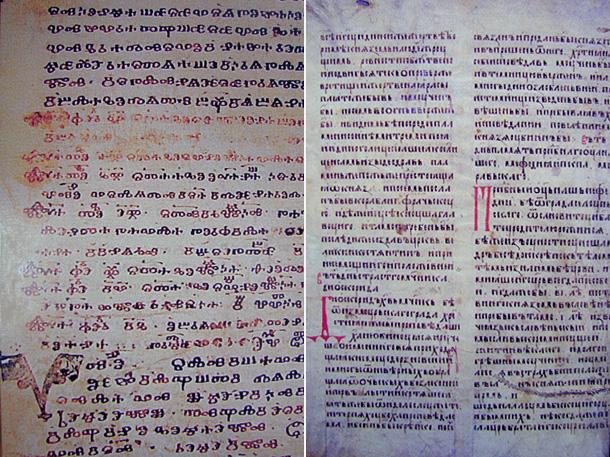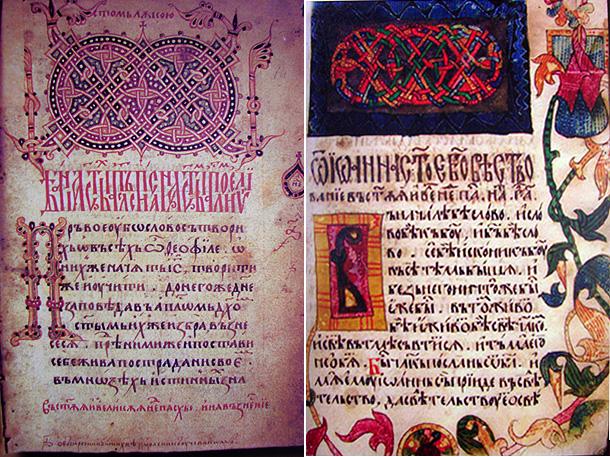 “Early in school we are told that Cyril and Methodius created the Slavic alphabet, translated the first and most important liturgical books and introduced church service in Slavonic with the western Slavs in Great Moravia (today the Czech Republic). Some may contest the importance of the original alphabet that the holy brothers invented – the glagolitic script, because later in history it was replaced with the Cyrillic alphabet widely in use to the present day. It is still unclear why, how and exactly when the replacement took place. In fact the Cyrillic alphabet is based on the Greek script adapted to the needs of the Slavic speech plus 10 original letters. These letters stand for specific Slavonic sounds absent in Greek speech. What is particularly important,” Prof. Hristova-Shomova explains, “is that the present-day alphabet has been made taking the Glagolitic script as a model. The glagolitic script was a perfect system of letters corresponding ideally to the Slavic speech. The work of the holy brothers Cyril and Methodius was however not limited to the invention of the letters. They laid the foundations of the Slavonic literary language. Back at that time Europe had two major written languages that boasted long centuries of literary tradition – Greek and Latin. Cyril and Methodius created a third literary language – Old Bulgarian. Though some scholars prefer to call it Old Slavonic, for us it is Old Bulgarian for two reasons. In the first place, it is Old Bulgarian given its phonetic makeup, reflecting the dialect of the Bulgarian Slavs. Secondly, all surviving written records in this language have Bulgarian origin.”
“Early in school we are told that Cyril and Methodius created the Slavic alphabet, translated the first and most important liturgical books and introduced church service in Slavonic with the western Slavs in Great Moravia (today the Czech Republic). Some may contest the importance of the original alphabet that the holy brothers invented – the glagolitic script, because later in history it was replaced with the Cyrillic alphabet widely in use to the present day. It is still unclear why, how and exactly when the replacement took place. In fact the Cyrillic alphabet is based on the Greek script adapted to the needs of the Slavic speech plus 10 original letters. These letters stand for specific Slavonic sounds absent in Greek speech. What is particularly important,” Prof. Hristova-Shomova explains, “is that the present-day alphabet has been made taking the Glagolitic script as a model. The glagolitic script was a perfect system of letters corresponding ideally to the Slavic speech. The work of the holy brothers Cyril and Methodius was however not limited to the invention of the letters. They laid the foundations of the Slavonic literary language. Back at that time Europe had two major written languages that boasted long centuries of literary tradition – Greek and Latin. Cyril and Methodius created a third literary language – Old Bulgarian. Though some scholars prefer to call it Old Slavonic, for us it is Old Bulgarian for two reasons. In the first place, it is Old Bulgarian given its phonetic makeup, reflecting the dialect of the Bulgarian Slavs. Secondly, all surviving written records in this language have Bulgarian origin.” 
After creating the new literary language, the holy brothers proceeded with the translation of liturgical books. Prof. Iskra Hristova-Shomova says that Cyril and Methodius not only designed a literary language with its own norms, but further enriched it with a compact body of accurate Christian terminology. Their disciples that Bulgarian Tsar Boris I welcomed to this country, established two literary schools in Preslav, Northeastern Bulgaria and in Ohrid, today in the Republic of Macedonia. This was the start of a prosperous literary tradition that transcended the borders of Bulgaria reaching out to exert its powerful influences in Russia, Serbia, Romania and other lands.

Prof. Hristova-Shomova says more: “For us this is the holiest holiday, because the holy brothers opened up spiritual horizons for us and paved the road for our spiritual and literary development. It is universal truth that even the greatest nations and empires risk being buried in oblivion if they lack a script. The Thracians for example, had powerful kingdoms and sophisticated culture, but they had no script, and all that we learn about them comes from written records left over by other cultures. We do have a good reason to celebrate the holy brothers Cyril and Methodius, because though Bulgaria was at times great and powerful or weak and at times oppressed, and its sovereigns either gained or lost territories, no one will ever take away from us the precious territory that the two brothers conquered.”
Cyril and Methodius Studies is a sphere attracting a lot of interest. There is now easier access to old manuscripts, and scholars have become increasingly productive.
“Currently, the Bulgarian Slavic medieval scholars are among the best in the world,” Prof. Iskra Hristova-Shomova says. “Bulgaria is a leading country in this area, and during major conferences the working language is Bulgarian. In the last decades Bulgarian researchers have made important discoveries. Fortunately, there are also a few young people keen on Cyril and Methodius studies. Some of them have already become known in international Slavic research circles.”
English version Daniela Konstantinova
The day of Saint Theodore known in Bulgarian as Todorovden is a significant Bulgarian holiday, which is celebrated on the Saturday after Cheesefare Sunday - this year its date is March 8. Todorovden combines pagan beliefs and Orthodox canon..
On February 16, Radio Bulgaria celebrates its 89th anniversary . Throughout these years, our multilingual media has been not only a channel of information, but also an invaluable link with our audience around the world. Today, Radio Bulgaria offers rich..
10 March is the Bulgarian Day of Rescue of Bulgarian Jews, Holocaust Victims and Crimes against Humanity With commemorative events in Sofia and in Russe with the participation of officials from Bulgaria’s Foreign Ministry, public administration,..

+359 2 9336 661
